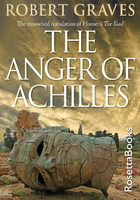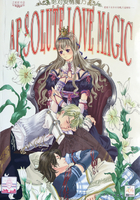The Olympians sat in Zeus' presence, discussing mortal affairs and gazing down on the city of Troy, while the pretty Goddess Hebe tripped from throne to throne across Heaven's golden floor and replenished golden goblets with nectar. They drank one another's healths.
Zeus, to tease Hera, said slyly: 'Fortunate Menelaus has a couple of goddesses at his service-Hera, and my friend Alalcomenes' young pupil Athene. Look at them seated close together, watching their champion! Paris, for his part, can count on Laughter-Loving Aphrodite's assistance; just now she rescued him from what seemed certain death. So we should surely decide now which alternative to favour: whether more war, or a reconciliation of the two armies? Everyone, I trust, agrees that the city of Troy must not cease to exist, but that Menelaus should get his wife back.'
Hera and Athene, busy plotting the Trojans' overthrow, muttered their dissent. Athene managed to curb her rage at Zeus' mention of the mortal tutelage under which she had once been placed; but Hera, having less self-control, burst out: 'Revered husband, what are you saying? After I have driven my horses nearly off their feet, and sweated almost as much myself, mustering that immense Greek army and launching it against Priam and his sons, how can you bear to ruin my work? Do as you please, of course; the rest of us are by no means unanimously in favour of your proposal.'
'Heartless, am I?' Zeus echoed gruffly. 'Look at yourself! What great injury have Priam and his sons done you that justifies this furious resolve to sack his splendid fortress? Perhaps the only way of glutting your horrid appetite would be for you to burst through the gates and eat the whole royal family raw-and every Trojan commoner into the bargain? Well, I should let that pass, so long as no fresh trouble arises between us. But here is a serious warning: if some day I feel inclined to destroy a city of which you happen to be fond, I will tolerate no opposition. You must acquiesce, with a loyal pretence of cheerfulness; since of all cities under the sun and stars, holy Troy is the one I most value. Priam and his fighting people have never once failed to honour their altars with the libations and burnt offerings due to my majesty.'
'It is a bargain!' answered Hera. 'If you should feel a sudden dislike for any of the three cities which I most value-Argos, Sparta, and Mycenae of the Broad Streets-I shall certainly not raise a finger in their defence: you may destroy them all. Indeed, it would be foolish to oppose you or bear a grudge afterwards, because your power is far greater than mine. Still, projects at which I have worked so hard should not be baulked. I am as divinely born as you are, and claim the Queendom of Heaven on two counts: being both a daughter of Father Cronus, whose kingdom you usurped, and your wife. Very well then: each of us can humour the other, in a hope that all Immortals will henceforth adopt our common policy. So send Athene down to the Scamandrian Plain where the armies are raising such an outcry over Menelaus' victory; she might well persuade some stupid Trojan to break the armistice.'
Zeus agreed. He called Athene and said briskly: 'Hurry off and do as Hera suggests!'
Pallas Athene darted from Olympus, eager to carry out this plan. Disguised as a meteor of the kind that scatters sparks when it falls, and is greeted with awe by sailors or an army, she plunged down on the no-man's-land between Greeks and Trojans. A cry of astonishment went up, and it was remarked on both sides: 'That meteor must have some deep significance! Either it foreshadows a return of hard fighting, or else it is Zeus' promise of peace.'
Athene next disguised herself as a Trojan-Antenor's sturdy son Laodocus-and ran in search of Pandarus, son of Lycaon. She found him with his Aesepian contingent, and said urgently: 'Take my advice, Pandarus, and shoot King Menelaus! Think of the fame, think of Paris' gratitude! He can be counted upon for a very handsome gift if your arrow flies straight and his rival gets laid on a funeral pyre. Quick! Pick him off while you still may, and vow to Wolfish Apollo, God of Archers, that, once safe home at Zeleia, you will sacrifice a hundred unblemished first-born lambs on his altar.'
Like a fool, Pandarus listened to Athene, and drew his polished oryx-horn bow out of its case: a magnificent weapon. He had once waited long hours in ambush for that oryx to emerge from a rock shelter, toppling it down at last with an arrow through the windpipe; a capable bowyer then secured the beast's four-foot horns together at their bases, polished them well, and added golden tips. Pandarus now lowered the bow to the ground and strung it with bull's sinew; but did so behind a screen of shields in case the Greeks might forestall this treachery by attacking him. Next, he opened his quiver, chose the brand-new shaft which was due to cause so much mischief, fitted it to the bow-string, and uttered the vow that Athene had put into his mouth. This done, he bent the bow back to his chest[4] until the iron barbs lay level with his bow-hand. A moment later he let fly; horn twanged, string whined, arrow hurtled.
The Immortals did not, however, forget Menelaus the Yellow-Haired: Athene posted herself in front of him and, like a careful mother brushing away a fly from her sleeping child, guided the arrow to where the least damage would be done. It struck Menelaus' golden belt-buckle, piercing belt, inlaid corslet, and the bronze taslet which he wore beneath to deflect arrow shots; and nicked his side.
Every horseman throughout Greece
Covets that famous masterpiece-
An ornamental chafron, stored
In the treasury of my lord-
And begs leave, only for a day,
To fix it on his bay, or grey.
But no, my lord will not permit
Any man else to handle it,
Any man else from far or near
Save his own royal charioteer-
Whose stallion sports it amid loud
Cries of amazement from the crowd.
This chafron comes from Caria
Or (some say) from Maeonia-
Craftswomen there are taught to stain
White ivory plaques that still retain,
Year after year, their fresh, bold, fine,
Red-purple patches of design.
Another eye-taking contrast of red-purple against ivory-white provoked cries of amazement when the blood from Menelaus' wound trickled down his strong thighs and legs as far as the ankles.
Agamemnon stood aghast. (So did Menelaus himself, until he turned and saw the arrow-head protruding behind his back, barbs, thread and all; then he breathed a sigh of relief.) Clutching his hand, Agamemnon gave vent to a loud groan, echoed by the staff, and exclaimed in ringing tones: 'Alas, my poor brother! I fear that the oath which pledged you to single combat in no-man's-land has proved your ruin: the Trojans have broken the armistice and transfixed you with an arrow. I would never, of course, suggest that oaths sworn over two sacrificial lambs and holy libations, and confirmed by a hand-shake, can be taken in vain! Even if Zeus does not immediately take vengeance on those who forswear themselves, he will do so in his own good time, punishing them with the loss of their lives, their wives, and their little children. I am more than ever assured that Troy's doom is sealed, also that of King Priam the Spearman and his subjects. Zeus, Son of Cronus, indignant at this outrage, will shake his shield threateningly from the Olympian throne; thus the armistice will not have been concluded in vain. Nevertheless, I should be most unhappy, brother, if you succumbed to that arrow. Your death, by removing the cause of war, might set my men clamouring for home-how ashamed I should be to find myself back on the thirsty plains of Argos, having allowed Priam's people to make good their old boast of keeping Helen! Your bones would rot in Trojan soil, and the proud Trojans capering on your tomb would scoff: "I pray the gods that ill-tempered Agamemnon will have no greater success in his other ventures than in this! He has sailed away empty-handed, and noble Menelaus lies here beneath our feet, his mission unaccomplished." Rather let the earth swallow me alive than that they should say such things!'
Menelaus was able to reassure him: 'The arrow has not wounded me in any vital part, though it went through this golden belt-buckle and corslet and metal taslet; so why spread alarm and despondency?'
'Indeed, I hope that you are right, brother,' answered Agamemnon. 'But pray ask a surgeon to examine the wound and apply a healing bandage.' Then, turning to Talthybius, he said: 'Find Asclepius' son Machaon, and inform him, with my compliments, that some Trojan or Lycian archer has unfortunately succeeded in wounding King Menelaus, son of Atreus; will he please attend to him at once?'
Talthybius obediently went down the Greek ranks until he reached the contingent from Tricca, famous for its horses, and delivered the message in Agamemnon's exact words. Machaon accompanied him to the circle of princes that had formed around Menelaus. He examined the arrow, grasped its heel and, first breaking off the barbed head, pulled it free from taslet, corslet, and belt. Having unbuckled these, he sucked out a mouthful of blood from the wound, for fear of poison, and applied a healing herbal bandage, the recipe of which his father Asclepius had been given by Cheiron the Centaur.
Meanwhile, since the Trojans were re-arming, the Greeks followed suit. King Agamemnon rose to the occasion; nobody could accuse him of sloth, fear, or lack of zeal. He left his bronze-panelled chariot and its restive team under the charge of Eurymedon, son of Ptolemaeus and grandson of Peiraeus, with orders to have them ready for him when he grew weary of marshalling the army. Then he strode from contingent to contingent, shouting:
'Greeks be eager, Greeks be bold!
For ZEUS, the God of Law,
Hates rascals who have failed to hold
His name in reverent awe.
'Great Troy shall fall, and vultures tear
The flesh of each proud liar
Whose wife and daughters home we'll bear-
Rich fruit for our desire!'
If the High King observed any reluctance to fight, he would cry furiously: 'Have you neither honour nor shame? You show about as much courage as fawns that have been chased across the plain to a standstill! I daresay you are waiting until the Trojans drive you back among our ships-where you hope that Almighty Zeus will stretch forth his arm in protection?'
He visited the Cretan contingent and found King Idomeneus the Sagacious, fierce as a wild boar, inspecting the front-line, while Prince Meriones saw that the companies in support armed themselves quickly. Agamemnon smiled and said: 'Idomeneus, I honour you above every one of my allies, not on the battlefield alone, but also when my Council meets to discuss strategic problems over a golden wine-bowl. For though your fellow-princes must content themselves with a single cupful apiece, I make sure that your cup is replenished as often as you drain it. Let me see you fight this afternoon no less staunchly than you have always vowed to do.'
'Son of Atreus,' King Idomeneus answered, 'you need not doubt that I will keep my promise; but pray leave us, and exhort your own troops! There is little time to waste on talk, now that the Trojans have broken the armistice. Yes, I agree: as the first to repudiate their oaths they can expect only sorrow and ruin.'
Agamemnon walked on, well pleased, towards the Salaminian and Locrian contingents, and saw Great Ajax and Little Ajax already advancing, surrounded by a mass of infantry.
Though not forgetful of his flock
Grazing below the scree,
The goatherd, perched upon a rock,
Sits watching the wide sea.
A pitch-black cloud whirls into sight
Across the western wave;
He runs after his goats in fright
And drives them to a cave.
The cloud provides an apt simile for those dark companies of spearmen marching in close order, shield touching shield. Agamemnon delightedly hailed the two Ajaxes, crying: 'It would be a mistake to give soldiers commanded by such impetuous princes any further encouragement-you have taken care of that yourselves. O Father Zeus, and Athene and Apollo! If only all my Councillors showed the same offensive spirit, we should soon capture and sack Priam's great city!'
Without awaiting a reply, he went on until he found King Nestor haranguing his Pylians-drawn up under their commanders Pelagon, Alastor, Chromius, Prince Haemon, and Bias. In front stood the chariots, supported by his main force of men-at-arms, with less dependable troops placed in the centre, where they had to fight whether it pleased them or not. Nestor was impressing on his charioteers that they must control their teams and avoid the infantry battle.
'I want none of you to presume on his courage or skill as a driver,' he told them, 'by rushing ahead of the rest; neither do I want any dragging at the horses' mouths-that diminishes the shock of a charge. But whoever singles out an enemy chariot, levels his spear, goes for its crew, he is a soldier after my heart! Such, my men, are the spirited, yet not reckless, tactics that used to take fortified cities in the good old days.' For Nestor the Gerenian had a long experience of warfare.
Agamemnon congratulated him. 'Ah, if your limbs were still as young as your heart! We must all grow aged, I suppose. How I wish it had happened to someone other than you!'
'Alas, son of Atreus,' sighed Nestor, 'you should have seen me when I killed Prince Ereuthalion-though the gods never grant a man both youth and wisdom at the same time! I was raw enough then… Nevertheless, despite these grey hairs, I intend to keep up with the chariots and exercise my right to direct manoeuvres. Spear-fighting can be left to younger and stronger men.'
Agamemnon passed on light-heartedly, and next saw Menestheus the Chariot-Fighter, son of Peteus, standing idly among his Athenians[5] (famous for their loud war-cry); and with him Odysseus, equally inactive, among his tough Cephallenians. Not having yet received orders, these two princes were waiting until some other Greek contingent made a move. Such caution enraged the High King, who spoke sharply: 'Son of Peteus, Zeus' foster-son; and you, Odysseus the Crafty, inventor of low stratagems, why hang back waiting for others to begin? Noblemen who are always the first to gobble roast meat or swill sweet wine at my Council feasts, and never stop before their bellies are full, should be in the vanguard when serious fighting breaks out! But now, it seems, ten columns of my Achaeans are expected to cut you a passage through the Trojan ranks.'
Odysseus glared at Agamemnon. 'Son of Atreus,' he replied, 'guard your tongue! Do you dare charge us with hanging back? Once the Greek army launches a regular assault on the Trojans, you will see me, Telemachus' father, fighting desperately against the enemy champions-if, that is, you have any stomach for battle yourself. That speech was so much idle wind.'
Realizing that he had hurt Odysseus' pride, Agamemnon smiled and said: 'Illustrious son of Laertes, I did not speak too warmly in the circumstances, nor give you unneeded encouragement. I am, of course, sensible of the respect and loyalty you feel towards me; so, if any expression of mine has sounded offensive, we can settle our differences at some future meeting; but I hope that no harm has been done.'
He hurried away and, rejoining his own Achaeans at last, saw the chariotry still massed, wheel to wheel, but neither bold Diomedes nor Sthenelus making any preparation for combat. 'Of what are you afraid?' he scolded Diomedes. 'Why dally here while the battle takes shape? Your father, Tydeus the Horseman, never behaved in so cowardly a fashion. Everyone who knew him well agrees that he always rushed far ahead of his comrades. Though not having fought beside him myself, nor even had the pleasure of knowing him, I conclude that he was a gallant soldier. Once he visited Mycenae with King Polyneices, joint-heir to the Theban throne but banished by his brother Eteocles, and appealed for armed help in a war against Thebes. Our people assented, and changed their minds only when they sacrificed to Zeus and found the omens discouraging. The ambassadors went away but, on reaching the rush-beds and grasslands that flank the River Asopus, sent your father ahead to plead Polyneices' case at Thebes. A bold man was King Tydeus! A stranger, and alone, he nonchalantly entered the banqueting hall of King Eteocles and challenged the guests to feats of strength. What is more, with the Goddess Athene's help, he worsted them all in turn. Some aggrieved Thebans ambushed him on his way back-fifty spearmen to one! Maeon, son of Haemon, and Popyphontes, son of Autophonus, were the leaders, both famous warriors. Nevertheless, despite the fearful odds, your father killed the entire Theban force, except Maeon, whom he sent back alive in obedience to a heavenly sign. That same heroic Tydeus of Aetolia has a son now living-who cannot compare with him as a soldier, yet excels him as a talker!'
Diomedes listened to his overlord's reprimand and abstained from comment. But Sthenelus, son of the famous Capaneus (whom Zeus' thunderbolt struck dead a generation before, in the unsuccessful assault on Thebes), answered sharply: 'Why lie, King Agamemnon, when you are capable of telling the truth? Diomedes and I are far better men than our fathers. Although attacking stronger walls with a smaller army, he and I succeeded where they failed: we captured Thebes of the Seven Gates. And how? By not disregarding the omens-by placing ourselves under Zeus' protection; whereas they perished for their foolish pride. So, pray make no invidious comparisons between them and us!'
Diomedes looked sternly at Sthenelus. 'Brother,' he said, 'I forbid you to utter another word! Our High King may exhort the troops in whatever way he pleases. After all, who stands to win the greatest glory if we defeat the Trojans and take their city? And who stands to suffer the worst disgrace if we abandon the siege…? Come, we too must show our fighting spirit!' Then Diomedes leaped from the tail-board of his chariot with a clang of bronze that might have scared even a hero.
The west wind blustering out at sea
Provokes a wave to lift its head,
To travel shoreward menacingly
Compact and huge, a sight to dread;
Arching, it breaks with an uproarious boom
Against the headland, scattering clouds of spume.
The Greek army moved forward in the same relentless style, wave upon wave, bright sunlight glittering on arms and decorated armour. As soon as the commanders had given their orders, you would have thought them all dumb, so silently they advanced!
Listen to the ewes complaining
In our wide courtyard;
They can hear the lambs, I fear,
From their udders barred.
What loud bleating and entreating!
Patience, pretty dams:
Half the milk is for my master,
Half is for your lambs.
Just such a clamour was raised by the Trojan troops, who came from many distant regions and spoke no common language.
Athene the Owl-Eyed was encouraging the Greeks; Ares, the Trojans. Moreover:
Some were plagued by ROUT and TERROR,
Whom EARTH bore to AIR;
Some by STRIFE, dear twin of ARES-
That collusive pair!
STRIFE at first, flat on her belly,
Crawls with lowered crest,
Soon she treads the earth in triumph,
At her hideous best.
Strife, indeed, hurried through the ranks, whipping up angry passions, and causing much lamentable slaughter.
The two armies met with a clatter of bronze, fighting at spear's length, or shield-boss to shield-boss. A tremendous din arose: cries of agony, shouts of exultation, as men killed or were killed; and blood reddened the earth.
Two torrents in the green
Season of winter rain
Met and roared on again
Down to their deep ravine.
The shepherd climbed a hill,
A mile away he stood;
So furious was that flood
He heard its thunder still!
A shepherd could have heard the roar of this battle at an even greater distance!
The first Greek to kill a Trojan was Nestor's son Antilochus. He struck Echepolus, son of Thalysius, on the helmet-ridge, then jabbed him through the forehead with a spear. Darkness clouded Echepolus' eyes, and he toppled from his chariot like a falling tower. Prince Elephenor, son of Calchodon, commanding the tough Abantes, caught Echepolus' foot in mid-air and dragged the corpse off, coveting the valuable armour; he failed, however, to take his prize very far. Bold Agenor the Trojan, seeing Elephenor's weapon-side exposed, drove a spear deep into him. Elephenor died immediately, and a hot skirmish developed over his dead body: Trojans and Greeks leaped wolfishly at each others' throats, stabbing and hewing.
There followed the death of Sim?eisius the Trojan, Anthemion's son, so named because born by the banks of the Sim?eis River while his mother was coming home from a visit to her family sheep-range on Mount Ida. Sim?eisius did not live long enough to justify the cost of his upbringing: for Great Ajax's spear pierced the lad's right breast, close to the nipple, and emerged behind the shoulder-blade.
The wainwright with an axe of steel
Walks out a tree to find;
The felloe for some chariot-wheel
Engrosses his whole mind.
Young lakeside poplar, smooth and tall,
You catch his ruthless eye!
He hacks you down, green crown and all,
And leaves your trunk to dry.
So fell tall young Sim?eisius! Antiphus of the Polished Corslet cast a vengeful javelin at Great Ajax from some distance; but missed his aim and, instead, hit Odysseus' gallant comrade Leucus, who was trying to seize Sim?eisius' arms. The javelin caught him in the groin; he dropped the corpse and tumbled dead on top of it. Odysseus, furious at losing Leucus, strode forward in his bright bronze armour, then halted, glanced about him, chose his mark, and let fly a spear. The Trojans shrank back, but the spear was well aimed. It struck Democoon, Priam's bastard son, on the temple and transfixed his skull; Democoon, who had until recently been in charge of his father's racing mares at Abydus, dropped with a rattle of arms.
The Trojan front-line now gave way and, when Hector himself retired, the Greeks, yelling for joy, took possession of the enemy corpses and pressed onward.
Apollo, from his watchpost on the citadel of Troy, shouted furiously: 'Up and at them, men of Troy! Why yield to these invaders? They are human like yourselves, not statues of stone or iron; your weapons will go through them easily! Besides, Achilles, son of Thetis, is absent today-brooding in his hut by the sea.'
The Greeks were being urged to greater efforts by Athene, who exhibited her glory wherever she saw any slackening.
Fate's next victim was Diores the Epeian, son of Amarynceus. Peirous, son of Imbrasus, the Thracian from the River Aenus, threw a jagged boulder which struck his right ankle, smashing bone and sinews. Diores fell to the ground, stretching his arms for help, and gasped in anguish. Peirous completed his victory with a spear-thrust below Diores' navel; out gushed the intestines and he died. Hardly had Peirous stepped back, however, when Thoas the Aetolian's spear-point pierced his lung. Thoas came in closer, freed the heavy weapon, drew his sword, and drove it into Peirous' belly; yet the Thracian men-at-arms, distinguished by long pikes and peculiar top-knots, defended their leader's corpse. Despite Thoas' rank and courage, they sent him reeling away, without the spoils.
Peirous and Diores lay dead together among the bodies of numerous lesser men. No one could deny that it was a fearful battle-not even if Pallas Athene had taken him by the hand and led him unwounded through the mělée, warding off spear-lunges, sword-cuts, and random missiles. Hundreds of Trojans and Greeks were already scattered prone in the dust.















